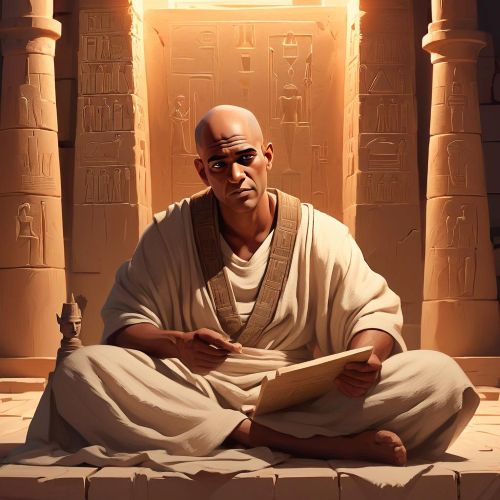Egyptian Mortals
Egyptian Mortals play a significant role in the mythology of ancient Egypt, showing how human figures were woven into stories alongside gods, spirits, and cosmic forces. While the gods were seen as eternal and all-powerful, the mortals in these myths often represented the virtues, struggles, and responsibilities of everyday life. Kings, queens, priests, warriors, and common people all appear in legendary tales, where their actions shaped history and revealed the values of Egyptian culture. Unlike divine beings, Egyptian Mortals had to navigate the challenges of fate, morality, and the will of the gods, making their stories both relatable and deeply symbolic.
Pharaohs were the most prominent among Egyptian Mortals, often portrayed as chosen by the gods to maintain balance and order, known as ma’at. While they were revered as divine rulers, their human qualities placed them firmly in the realm of mortals, subject to death and the afterlife. Many myths highlight their achievements in building monuments, expanding territories, or protecting Egypt from chaos, blending history with legend. Figures like these served as bridges between the human world and the divine, embodying both the greatness and limitations of mortal life. Their stories reinforced the idea that leadership came with sacred responsibility, and failure could bring imbalance to the land.
Beyond rulers, Egyptian Mortals also included heroes, sages, and ordinary individuals whose encounters with the gods revealed important cultural lessons. Tales of mortals gaining favor or falling into misfortune often highlighted the values of humility, piety, and justice. These characters were reminders that even without divine powers, humans could earn respect through their actions, wisdom, or bravery. The myths also reflected the Egyptian belief in the afterlife, where mortals faced judgment by Osiris and the weighing of the heart against the feather of truth. Such stories emphasized the enduring importance of living a righteous life.
The narratives of Egyptian Mortals were often preserved in hieroglyphic inscriptions, papyrus texts, and temple carvings that blended myth with historical memory. Many of these stories blurred the line between fact and legend, elevating real individuals into larger-than-life characters whose deeds carried moral and spiritual meaning. This combination of history and mythology allowed Egyptian Mortals to remain central figures in cultural identity, reminding people of the eternal link between human action and divine will. In this way, mortals were never insignificant; they were active participants in shaping both earthly and cosmic order.
Today, the legacy of Egyptian Mortals continues to fascinate scholars, storytellers, and enthusiasts of ancient history. Their stories provide valuable insight into how ordinary and extraordinary humans contributed to the mythology of Egypt, standing alongside gods and goddesses in shaping one of the world’s most enduring civilizations. Whether through the lives of pharaohs, warriors, or humble individuals, the mortals of Egyptian myth remind us of the timeless themes of courage, responsibility, and the quest for meaning in a universe ruled by both human will and divine power.
Egyptian Mortals play a significant role in the mythology of ancient Egypt, showing how human figures were woven into stories alongside gods, spirits, and cosmic forces. While the gods were seen as eternal and all-powerful, the mortals in these myths often represented the virtues, struggles, and responsibilities of everyday life. Kings, queens, priests, warriors, and common people all appear in legendary tales, where their actions shaped history and revealed the values of Egyptian culture. Unlike divine beings, Egyptian Mortals had to navigate the challenges of fate, morality, and the will of the gods, making their stories both relatable and deeply symbolic.
Pharaohs were the most prominent among Egyptian Mortals, often portrayed as chosen by the gods to maintain balance and order, known as ma’at. While they were revered as divine rulers, their human qualities placed them firmly in the realm of mortals, subject to death and the afterlife. Many myths highlight their achievements in building monuments, expanding territories, or protecting Egypt from chaos, blending history with legend. Figures like these served as bridges between the human world and the divine, embodying both the greatness and limitations of mortal life. Their stories reinforced the idea that leadership came with sacred responsibility, and failure could bring imbalance to the land.
Beyond rulers, Egyptian Mortals also included heroes, sages, and ordinary individuals whose encounters with the gods revealed important cultural lessons. Tales of mortals gaining favor or falling into misfortune often highlighted the values of humility, piety, and justice. These characters were reminders that even without divine powers, humans could earn respect through their actions, wisdom, or bravery. The myths also reflected the Egyptian belief in the afterlife, where mortals faced judgment by Osiris and the weighing of the heart against the feather of truth. Such stories emphasized the enduring importance of living a righteous life.
The narratives of Egyptian Mortals were often preserved in hieroglyphic inscriptions, papyrus texts, and temple carvings that blended myth with historical memory. Many of these stories blurred the line between fact and legend, elevating real individuals into larger-than-life characters whose deeds carried moral and spiritual meaning. This combination of history and mythology allowed Egyptian Mortals to remain central figures in cultural identity, reminding people of the eternal link between human action and divine will. In this way, mortals were never insignificant; they were active participants in shaping both earthly and cosmic order.
Today, the legacy of Egyptian Mortals continues to fascinate scholars, storytellers, and enthusiasts of ancient history. Their stories provide valuable insight into how ordinary and extraordinary humans contributed to the mythology of Egypt, standing alongside gods and goddesses in shaping one of the world’s most enduring civilizations. Whether through the lives of pharaohs, warriors, or humble individuals, the mortals of Egyptian myth remind us of the timeless themes of courage, responsibility, and the quest for meaning in a universe ruled by both human will and divine power.


